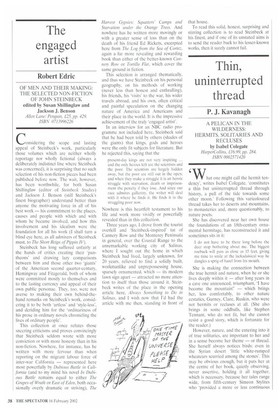The engaged artist
Robert Edric
OF MEN AND THEIR MAKING: THE SELECTED NON-FICTION OF JOHN STEINBECK edited by Susan Shillinglaw and Jackson J. Benson Allen Lane! Penguin, 125. pp. 429, ISBN 0713996226 Considering the scope and lasting appeal of Steinbeck's work, particularly those volumes which are neither wholly reportage nor wholly fictional (always a deliberately indistinct line where Steinbeck was concerned), it is surprising that no such selection of his non-fiction pieces had been published before now. The wait, however, has been worthwhile, for both Susan Shillinglaw (editor of Steinbeck Studies) and Jackson J. Benson (still Steinbeck's finest biographer) understand better than anyone the motivating force in all of his best work — his commitment to the places, causes and people with which and with whom he became involved, and how this involvement and his idealism were the foundation for all his work (I shall turn a blind eye here, as all admirers of Steinbeck must, to The Short Reign of Pippin 111.
Steinbeck has long suffered unfairly at the hands of critics creating their 'pantheons' and drawing lazy comparisons between him and those other two 'giants' of the American second quarter-century, Hemingway and Fitzgerald, both of whom were committed mostly to themselves and to the lasting currency and appeal of their own public personae. They, too, were not averse to making their own behind-thehand remarks on Steinbeck's work, considering it to be both 'artless' and 'style-less', and deriding him for the 'ordinariness of his prose in ordinary novels chronicling the lives of ordinary people'.
This collection at once refutes those sneering criticisms and proves convincingly that Steinbeck seldom wrote with more conviction or with more honesty than in his non-fiction. Nowhere, for instance, has he written with more fervour than when reporting on the migrant labour force of inter-war California — represented here most powerfully by Dubious Battle in California (and to my mind his novel In Dubious Battle remains equal to either The Grapes of Wrath or East of Eden, both occasionally overly dramatic or striving), The
Harvest Gypsies: Squatters' Camps and Starvation under the Orange Trees. And nowhere has he written more movingly or with a greater sense of loss than on the death of his friend Ed Rickets, excerpted here from The Log from the Sea of Cortez, again a far more revealing and rewarding book than either of the better-known Cannery Row or Tortilla Flat, which cover the same ground in fiction.
This selection is arranged thematically, and thus we have Steinbeck on his personal geography, on his methods of working (never less than honest and enthralling), his friends, his 'visits' to the war, his wider travels abroad, and his own, often critical and painful speculation on the changing nature of America and Americans and their place in the world. It is the impressive achievement of the truly 'engaged artist'.
In an interview for an NBC radio programme not included here, Steinbeck said that he had been told by others (shades of the giants) that kings, gods and heroes were the only fit subjects for literature. But he rejected this, saying that the
present-day kings are not very inspiring and the only heroes left are the scientists and the poor. The scientists are largely hidden away, but the poor are still out in the open, and when they make a struggle it is an heroic struggle with starvation, death or imprisonment the penalty if they lose. And since our race admires gallantry. the writer will deal with it where he finds it. He finds it in the struggling poor now.
Nowhere is this heartfelt testament to his life and work more vividly or powerfully revealed than in this collection.
Three years ago, I drove from the tourist overkill and `Steinbeck-inspired' tat of Cannery Row and the Monterey Peninsula in general, over the Coastal Range to the unremarkable working city of Salinas, where I sought out the home in which Steinbeck had lived, largely unknown, for 20 years, relieved to find a solidly built, workmanlike and unprepossessing house, sparsely ornamented, which its modern lawn sign apart — attracted no more attention to itself than those around it_ Steinbeck writes of the place in the opening article here, Always Something to Do in Salinas, and I wish now that I'd had the article with me then, standing in front of that house.
To read this solid, honest, surprising and stirring collection is to read Steinbeck at his finest, and if one of its unstated aims is to send the reader back to his lesser-known works, then it surely cannot fail.




































































 Previous page
Previous page